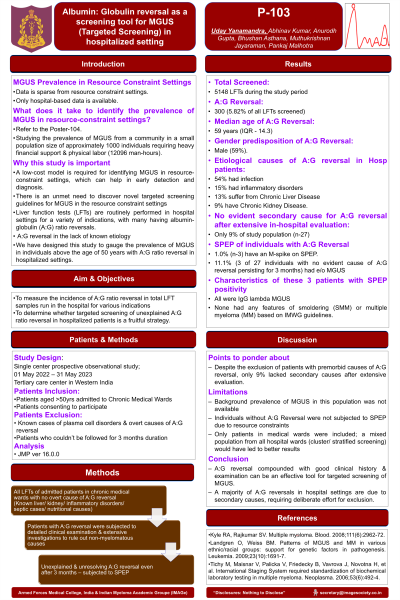Plasma Cell Precursor Disorders
Poster Session 1
P-103: ALBUMIN: GLOBULIN REVERSAL AS A SCREENING TOOL FOR MGUS (TARGETED SCREENING) IN HOSPITALIZED SETTING
Wednesday, September 27, 2023
1:30 PM - 2:30 PM EEST


Uday Yanamandra, DM
Professor
Armed Forces Medical College
Pune, Maharashtra, India
Introduction: There is an unmet need to discover novel targeted screening guidelines for monoclonal gammopathy of undetermined clinical significance (MGUS) in the Indian scenario which can help in early detection and diagnosis. Liver function tests (LFTs) are routinely performed in hospital settings for a variety of indications, with many having albumin-globulin (A:G) ratio reversals. We have designed this study to gauge the prevalence of MGUS in individuals above the age of 50 years with A: G ratio reversal in hospitalized settings. The objectives of the study were to measure the incidence of A: G ratio reversal in total LFT samples run in the hospital for various indications and to determine whether targeted screening of unexplained A: G ratio reversal in hospitalized patients is a fruitful strategy.
Methods: This is a single-center, prospective observational study carried out from 01 May 2022 to 30 May 2023 at tertiary care center in Western India. All the LFTs of the admitted patients over the study period to the medical wards were included in the study. Patients with A:G reversal were subjected to detailed clinical examination and investigations to rule out non-myelomatous causes for the reversal of the ratio. Samples with unexplained A:G ratio reversal and unresolving A:G reversal despite of three months of observation were subjected to Serum Protein Electrophoresis (SPEP). Data was analysed using JMP ver. 16.0.0.
Results: A total of 5148 LFTs were screened during the study period, of which 300 (5.82%) had A:G reversal. The median age of the study population with A:G reversal was 59 years (IQR - 14.3) with a male preponderance (59%). Etiologically amongst patients with A:G reversal 54% had infection, 15% had inflammation, 13% suffer from Chronic Liver Disease and 9% have Chronic Kidney Disease. Only 9% of patients (n-27) had no evident secondary causes, and of these 11% (n-3) have an M-spike on SPEP. Of all patients with A:G reversal, 1.1% have evidence of MGUS, all being IgG Lambda variants and none having any features of smoldering or multiple myeloma based on IMWG guidelines.
Conclusions: A:G reversal compounded with good clinical history and examination can be an effective tool for targeted screening of MGUS. A majority of A:G reversals in hospital settings are due to secondary causes, requiring deliberate effort for exclusion.
Methods: This is a single-center, prospective observational study carried out from 01 May 2022 to 30 May 2023 at tertiary care center in Western India. All the LFTs of the admitted patients over the study period to the medical wards were included in the study. Patients with A:G reversal were subjected to detailed clinical examination and investigations to rule out non-myelomatous causes for the reversal of the ratio. Samples with unexplained A:G ratio reversal and unresolving A:G reversal despite of three months of observation were subjected to Serum Protein Electrophoresis (SPEP). Data was analysed using JMP ver. 16.0.0.
Results: A total of 5148 LFTs were screened during the study period, of which 300 (5.82%) had A:G reversal. The median age of the study population with A:G reversal was 59 years (IQR - 14.3) with a male preponderance (59%). Etiologically amongst patients with A:G reversal 54% had infection, 15% had inflammation, 13% suffer from Chronic Liver Disease and 9% have Chronic Kidney Disease. Only 9% of patients (n-27) had no evident secondary causes, and of these 11% (n-3) have an M-spike on SPEP. Of all patients with A:G reversal, 1.1% have evidence of MGUS, all being IgG Lambda variants and none having any features of smoldering or multiple myeloma based on IMWG guidelines.
Conclusions: A:G reversal compounded with good clinical history and examination can be an effective tool for targeted screening of MGUS. A majority of A:G reversals in hospital settings are due to secondary causes, requiring deliberate effort for exclusion.
